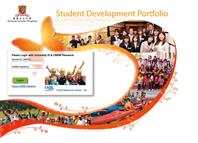CUHK sets great store by its students’ whole-person development. Along with classroom learning, non-formal education which includes overseas exchange, personal growth activities, leadership training and voluntary services, is a vital component in a student’s resumé. But, how can the University and students keep track of such information and present it systematically? The new Student Development Portfolio (SDP), a web-based system established by the Office of Student Affairs (OSA), is a solution.
Mr. Raymond Leung, Director of Student Affairs, related the birth of the system, ‘Several years ago, the Quality Assurance Council of the University Grants Committee released its Report of a Quality Audit of CUHK, which commended the University for, among other things, the “variety and extent of experiential learning opportunities available to students”. It also recommended the University to strengthen the coordination of different pastoral student support agencies so as to ensure that there is a concerted institution-wide effort to facilitate our students’ all-round development.’ In addition, more extracurricular activities should be provided to meet the needs of the increased student population under the new 3+3+4 curriculum reform. A task force was then set up to look into the issue. After comprehensive study and consultations, the multi-purposed SDP was developed.
University units can create their own accounts in the SDP system, and input activity details when they hold student activities eligible for registration. They will be asked to put their activities into one of the five pre-established categories (i.e., I, C, A, R, E). When that is done, students can register for those activities online. After the completion of a particular activity has been verified by the organizer, the system will enter that into the participating students’ records. If students have taken part in activities held by student bodies or parties outside the University, they can report them through the system and add them to their personal records.
By simply pressing a button, students can access their records of experiential learning and generate a report when they need it for further study or employment.
The system makes it easy for students to manage their experiential learning opportunities. It also gives different University units a broad picture of the natures of the activities organized for students on campus, thus helping them to better allocate their resources to facilitate students’ holistic development.
It is optional for units to use the system. But the OSA has received encouraging response. Raymond said that so far a total of 50 student support units had pledged to use the SDP system, including the nine Colleges, various Faculties, departments and administrative units. And the training workshops and briefing sessions organized by the OSA on SDP for staff members and students have been attended by representatives from most of the relevant University units. 



































































































































































Social Bookmarks